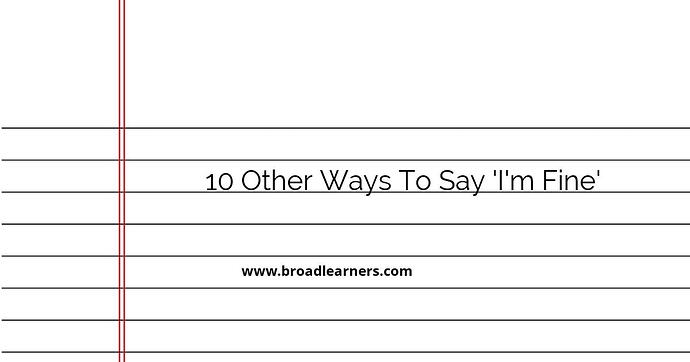When someone asks you how you're doing, the usual response is 'I'm fine.' While this response is simple and commonly used, there are other alternatives that you can use to express how you're feeling. Here are 10 other ways to say 'I'm fine':
- I'm doing well, thank you.
- I'm good, thanks.
- I'm great, how about you?
- Everything is going well.
- Couldn't be better.
- I'm alright.
- I'm okay.
- Not too bad.
- Doing just fine.
- Can't complain.
Let's explore each alternative in more detail:
1. I'm doing well, thank you.
This response shows that you're not only fine but also doing well. It's a polite and positive way to express how you're feeling.
Example:
Person A: How are you?
Person B: I'm doing well, thank you. How about you?
2. I'm good, thanks.
This response indicates that you're feeling good. It's a simple and casual way to express that you're fine.
Example:
Person A: How's it going?
Person B: I'm good, thanks. What about you?
3. I'm great, how about you?
This response shows that you're not only fine but also feeling great. It's a friendly and engaging way to ask the other person how they're doing.
Example:
Person A: How are you today?
Person B: I'm great, how about you?
4. Everything is going well.
This response implies that everything in your life is going smoothly. It's a positive and optimistic way to say that you're fine.
Example:
Person A: How's life treating you?
Person B: Everything is going well. Thanks for asking.
5. Couldn't be better.
This response indicates that you're not only fine but also extremely happy with the current state of affairs. It's a cheerful and enthusiastic way to express how you're feeling.
Example:
Person A: How's your day going?
Person B: Couldn't be better! It's been amazing so far.
6. I'm alright.
This response implies that you're feeling okay and nothing significant is bothering you. It's a neutral and casual way to say that you're fine.
Example:
Person A: How are things?
Person B: I'm alright. Nothing to complain about.
7. I'm okay.
This response indicates that you're feeling okay but not necessarily great. It's a simple and honest way to express how you're feeling.
Example:
Person A: Are you feeling better?
Person B: I'm okay. Still recovering, but getting there.
8. Not too bad.
This response suggests that things could be better, but overall, you're doing fine. It's a slightly negative but realistic way to say that you're fine.
Example:
Person A: How's your day been?
Person B: Not too bad. Just a few minor setbacks.
9. Doing just fine.
This response indicates that you're doing fine without any major issues. It's a confident and content way to express how you're feeling.
Example:
Person A: How's everything?
Person B: Doing just fine. No complaints.
10. Can't complain.
This response suggests that you have nothing to complain about and things are going well. It's a lighthearted and optimistic way to say that you're fine.
Example:
Person A: How's life treating you?
Person B: Can't complain. Life's treating me well.
These alternatives to 'I'm fine' allow you to express your well-being in different ways, depending on the context and your level of comfort with the person you're speaking to. Choose the response that best fits your mood and the situation, and remember to ask the other person how they're doing as well.
Did I miss anything? Respond below
